Sunday Feb 22, 2026
Sunday Feb 22, 2026
Tuesday, 29 October 2019 00:00 - - {{hitsCtrl.values.hits}}
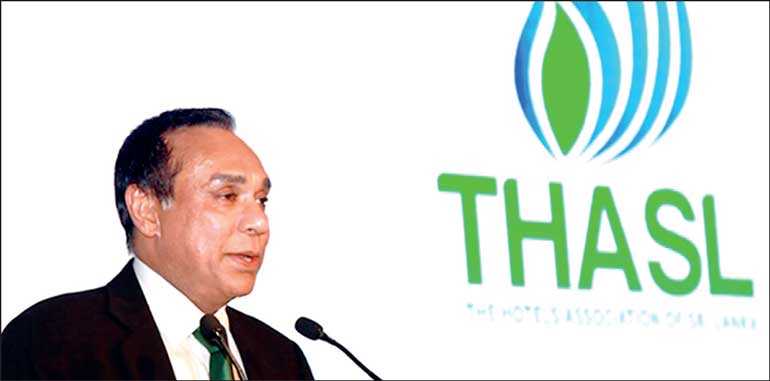
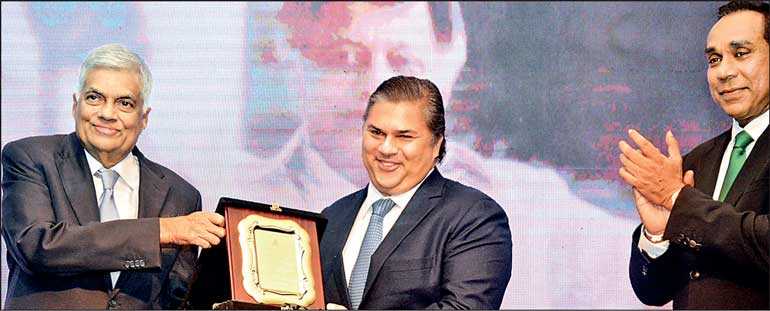
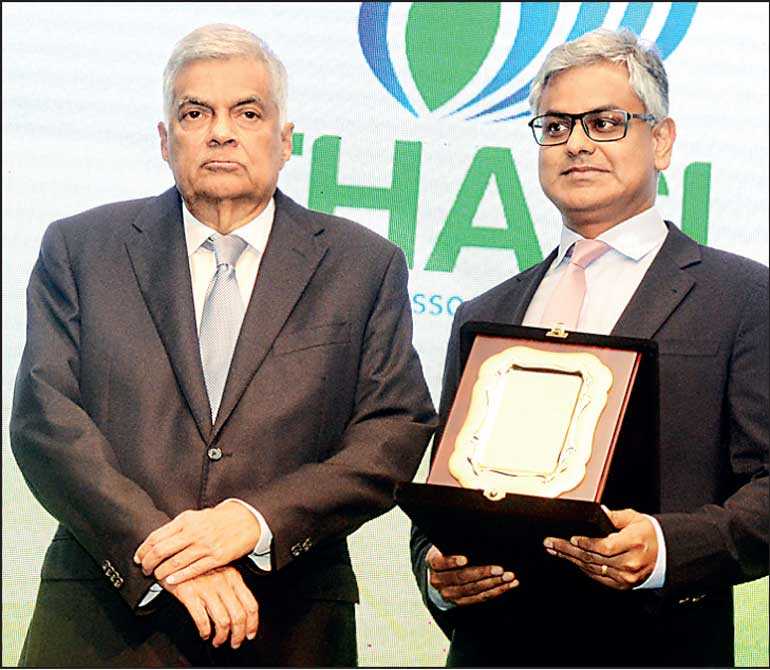
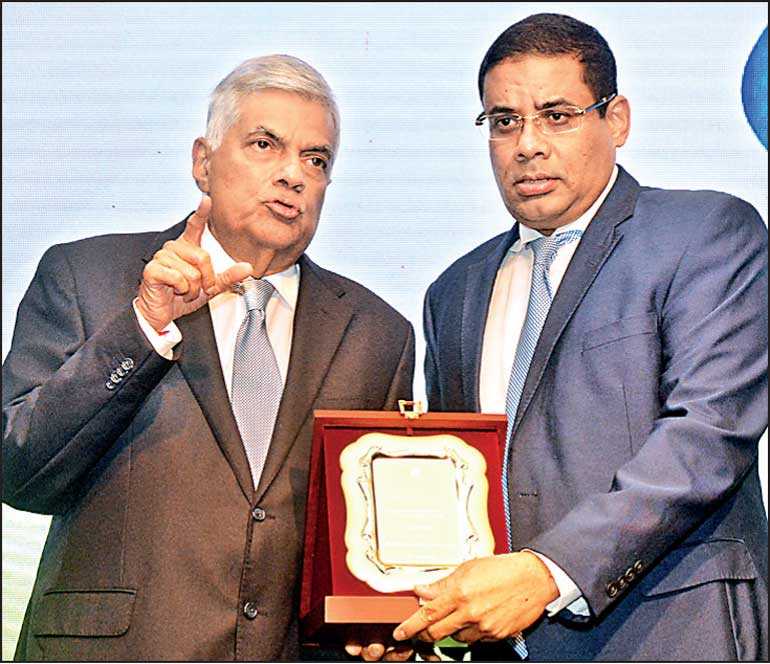
The Hotels Association of Sri Lanka (THASL) held its 54th Annual General Meeting last week, with Prime Minister Ranil Wickremesinghe as the Chief Guest and Emirates Airline President Tim Clark as the keynote speaker. THASL President Sanath Ukwatte was re-elected for the fourth consecutive time, and at the post-AGM banquet, he traced the recent success of Sri Lanka tourism as well as outlining several challenges and THASL’s suggestions to overcome those. Below are excerpts of Ukwatte’s address.
I feel honoured today to represent this prestigious Association, The Hotels Association of Sri Lanka, for the fourth consecutive time as its President. This is our 54th annual gathering, and for a little over half a century, this Association has been represented by men and women who have dedicated their blood, sweat, and money to get where we are today. I would like to dedicate this evening to the predecessors who have built the foundation of our Industry.
Legendary passion for tourism
We are an industry that has inspired so many. Our industry, which is very much homegrown, is built on generations of people who have committed themselves to hard work and the prosperity of our 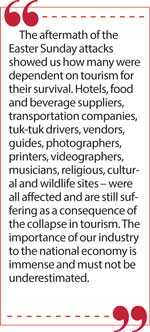 motherland. As our Association celebrates its 54th year, I wish to acknowledge some of the historic legends of our industry who has contributed to its growth and prosperity. People like Herbert Cooray, George Ondaatjie, Saparamadu, Askar Moosajee, Cyril Gardiner, Prof. Tony Furkhan, Ratna Sivaratnam and my father U.K. Edmund - all started when the hotel and tourism industry was at its infancy in Sri Lanka. These past legends came from diverse backgrounds, different religions, ethnicities and from across the country. But they all had one thing in common. They had faith. Faith in our industry, faith in our country and most of all, faith in our people.
motherland. As our Association celebrates its 54th year, I wish to acknowledge some of the historic legends of our industry who has contributed to its growth and prosperity. People like Herbert Cooray, George Ondaatjie, Saparamadu, Askar Moosajee, Cyril Gardiner, Prof. Tony Furkhan, Ratna Sivaratnam and my father U.K. Edmund - all started when the hotel and tourism industry was at its infancy in Sri Lanka. These past legends came from diverse backgrounds, different religions, ethnicities and from across the country. But they all had one thing in common. They had faith. Faith in our industry, faith in our country and most of all, faith in our people.
The foundation laid by our industry’s historic legends paved the way for the more recent icons in our sector. Inspiring and celebrated leaders such as Harry Jayawardana, Dhammika Perera, Merril Fernando, Hiran Cooray, Hettigoda, Sudana Rodrigo, Ravi Thambiayah, Abbas Esufally, the Hirdramani family, Ajit Wijesekera, Bob Kundanmal, and Chandra Wickremasinghe are all living examples of people who have risked their hard-earned money and kept investing in our country to create world-class products.
They are inspiring leaders who have always shown faith in our country and in our industry, no matter the challenges that came their way. Whether it’s a tsunami, terrorism or an epidemic, they are people who believe in our hospitality, our rich biodiversity, cultural heritage, and the uniquely authentic product we offer to our visitors.
They are leaders who fervently believe that we are second to none. And they have passed on this belief to their children and even to their grandchildren. It’s a great pleasure for me and the rest of the industry to see their children and grandchildren carry on this dream they have inherited and to keep their faith and conviction alive.
I consider myself very fortunate to serve in a Committee with this talented young generation of hoteliers, to learn from them and guide them whenever there is a need. We would like to see more Sri Lankans follow them and join this success story.
Today we are presenting posthumous awards to 2 outstanding individuals, Ratna Sivaratnam and Cyril Gardiner. They were pioneers and torch-bearers who blazed a trail in our industry, and were a source of inspiration to me as a young man.
Tourism at crossroads after Easter Sunday tragedy
This year has been a challenging and tragic year for all of us. On Easter Sunday, innocent people visiting hotels and praying at churches were brutally targeted and murdered by terrorists for the first time in our history. Our hearts and prayers go out to the families and loved ones of those who were affected by this barbaric act of terror. We pray for the loved ones they lost and hope that the collective prayers of our nation may bring them some peace and solace.
The Easter Sunday attacks were quickly followed by localised civil unrest, attacks on Muslim shops and homes, and an uncontrollable rumour mill that sought division and mistrust. The consequences of these events have been debilitating to our country. It has bared our consistent failure at nation building. It has shown that despite a whole decade after the end of our civil war, we are yet to win peace for all our people.
Our industry is yet to recover from this tragedy, and the unfortunate likelihood is that it will take another year to get back to where we were. A once thriving industry, with everything going for it, is today in the throes of a crisis. It is in this backdrop I would like to offer our Association’s appreciation to Sir Tim Clark for accepting our invitation and coming all the way in spite of his very busy schedule. Sir Tim – thank you, we are grateful for your support.
Our Association is strongly of the opinion that we can get ourselves out of this crisis situation if the Government and the industry collectively move swiftly and decisively, on our road map to recovery. I wish to speak about 3 important steps on that today.
First step: recovery
Our first step in our recovery roadmap following the Easter Sunday attacks, with the aim of safeguarding the livelihoods of our employees, we lobbied hard with the Government to offer a financial  relief package to our members, which I am sure all of you are well aware of. We thank Hon. Minister of Tourism, Hon. Minister of Finance and the Governor Central Bank and the Government for accepting our suggestions, and offering this relief to meet our immediate needs. Your swift action in this regard has saved many jobs and livelihoods.
relief package to our members, which I am sure all of you are well aware of. We thank Hon. Minister of Tourism, Hon. Minister of Finance and the Governor Central Bank and the Government for accepting our suggestions, and offering this relief to meet our immediate needs. Your swift action in this regard has saved many jobs and livelihoods.
The aftermath of the Easter Sunday attacks showed us how many were dependent on tourism for their survival. Hotels, food and beverage suppliers, transportation companies, tuk-tuk drivers, vendors, guides, photographers, printers, videographers, musicians, religious, cultural and wildlife sites – were all affected and are still suffering as a consequence of the collapse in tourism. The importance of our industry to the national economy is immense and must not be underestimated. We are the low hanging fruit for Sri Lanka’s economic revival. Therefore, we all must act to protect and grow this industry.
Second step: global PR and marketing
Our second step in the road map is to enhance the country’s marketing arm and roll out the promised international PR and marketing campaign.
During our Association’s AGM last year, we were grateful to have the Hon. Prime Minister’s presence, at which point, we requested for the Government to roll out the much-delayed destination branding and marketing campaign. We were confident that, nearly a decade after the end of our civil war, Sri Lanka would finally launch our much-awaited marketing campaign. In October 2018 during our AGM, none of us ever imagined the constitutional crisis that was to follow a few days later, or the impending horror of Easter Sunday. Both these events have had a major negative impact on our industry, with the Easter Sunday tragedy bringing us to our knees.
Yet, despite six months following this tragedy and the commendable support and leadership that our Minister, Kishu Gomes as Chairman of the Sri Lanka Tourism Promotions Bureau, and Johanne Jayaratne, Chairman Sri Lanka Tourism Development Authority, has given our industry, yet the Government has failed to launch a global PR and marketing campaign.
Every single tourism service provider registered with the Tourism Development Authority makes a financial contribution towards the promotions and marketing of Sri Lanka as a tourism destination. Yet, despite over a decade since the end of Sri Lanka’s civil war, these funds remain unutilised, wasted in a bureaucratic nightmare that consecutive Governments have failed to overcome. Every minute that we fail to launch this campaign has an opportunity cost for Sri Lanka. We lose potential tourists, potential revenue streams and potential investments.
It is in light of this realisation, following a decade of Government inaction that we propose to reform the Promotions Bureau, and to transfer the control of the promotions fund to the Tourism Joint Council in a bold, new, and ambitious public-private partnership. We are convinced that the industry-led Tourism Joint Council will be better suited to carry out the responsibilities of promotions, as opposed to a Promotions Bureau tied up in bureaucratic red tape. The Joint Council represents all the actors in the tourism industry that directly impacted by consecutive Government failures in launching a promotion campaign.
Tourism is a fast-evolving product. It has to respond to fast-emerging trends, opportunities and threats. “Fast” is sadly not something synonymous with bureaucratic red-tape. A fund that has remained idle in Government hands for a decade is evidence that these monies are better off in the hands of those who contribute towards it and are directly impacted by how such money is used.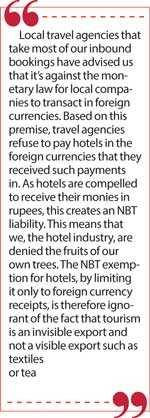
Today, many countries in the world has handed over control of tourism promotions funds to the private sector. It’s the trend today. In Germany, for example, 70% of the tourism promotional funds come from the Government and 30% from the private sector. Yet, 100% of the administration of the fund is given to the private sector.
We propose a similar solution for Sri Lanka. We request the Government to bring forward and for Parliament to approve amendments to the Tourism Act that will:
a) Transfer control and direction over the Sri Lanka marketing and promotions fund to the Tourism Joint Council; and
b) Impose enhanced reporting obligations by the Tourism Joint Council to the Promotions Bureau and Tourism Development Authority to ensure transparency and accountability for the utilisation of the promotions fund.
We are confident that by giving control and ownership over the country’s marketing to the industry itself, we can hire the right talent and make decisions that will respond to challenges and capitalise on new opportunities as they emerge, without being burdened by bureaucracy.
Third step: reforming taxation on tourism
The third step that we propose in our recovery road map, is to reform taxation in the tourism industry.
Tourism is one of the highest-taxed industries in the country. We pay as much as 20% tax on turnover alone and after paying service charge, exorbitant licensing levies, and unfair local government taxes that only target hotels, we become totally uncompetitive. This is in stark contrast to the top-line tax paid by our competitors in regional tourism markets, which are only between 5-10% of revenue.
After the Easter Sunday attacks, the Government took the bold and right decision to support the industry by lowering VAT to 7% for the tourism industry. We hope and request the new lowered VAT will continue and is not a temporary measure.
We also thank the Government for exempting the hotel industry from paying NBT on foreign currency receipts. One of our key requests last year was for the Government to grant the tourism industry export status and to treat us the same as other exporting industry. NBT is not paid by other exporters, therefore we welcome the NBT exemption. However, by limiting the exemption from NBT only to foreign currency receipts, the Government has ignored that most spending by tourists in Sri Lanka is conducted in Sri Lankan rupees and not foreign currencies. This is because:
a) The rupee is the legal tender in Sri Lanka;
b) We are prohibited by law from charging and accepting payments in foreign currencies; and
c) Tourists have already converted their foreign currencies to rupees before they spend at our establishments.
Local travel agencies that take most of our inbound bookings have advised us that it’s against the monetary law for local companies to transact in foreign currencies. Based on this premise, travel agencies refuse to pay hotels in the foreign currencies that they received such payments in. As hotels are compelled to receive their monies in rupees, this creates an NBT liability. This means that we, the hotel industry, are denied the fruits of our own trees.
The NBT exemption for hotels, by limiting it only to foreign currency receipts, is therefore ignorant of the fact that tourism is an invisible export and not a visible export such as textiles or tea. We therefore request the Government to give more clarity on this issue and to either:
a) Classify all receipts by the hotel industry as NBT exempt (irrespective of currency); or
b) To liberalise the monetary law so that we are able to accept payments in foreign currencies, in order to fully benefit from the NBT exemption.
Reformed taxation must not only be limited to the income of hotels. We believe, taxation must be rational and sensible in all other inputs for tourism. This requires reducing exorbitant consumption taxes on food, beverages, alcohol (especially wine), restaurant, bar and hotel licensing and even construction inputs. We are aware the Government has embarked on a progressive reduction or elimination of most of these import duties. We commend this bold initiative but encourage the Government to aggressively pursue this reduction and fast-track it in areas that can boost the sectors that service the tourism industry, such as restaurants, bars and entertainment.
Master plan for sustainable tourism
Finally we also appeal to the Government to introduce a tourism master plan for sustainability and to develop that master plan with all stakeholders in the industry, including airlines, travel agents, hotels and the public.
Our Association wants Sri Lanka to be an emblem of sustainable tourism. We are concerned by the future risks of over tourism and overcrowding to our cultural and wildlife assets and infrastructure. We therefore call for a bold, new and progressive tourism master plan that will, amongst others, guide us to avoid or manage and address those risks when they arise. We are determined to be prepared to address these issues and are convinced that such preparation needs to be given priority over setting high visitor numbers. A well planned and properly regulated tourism will be sustainable in the future.Hon. Prime Minister, Hon. Ministers, Excellencies, ladies and gentlemen, we have had one of our most challenging and difficult years to date. But with determination and commitment from us and the Government, I can assure you that the best days for tourism is yet to come. Let us all embark on this journey in a responsible manner. Our Association is there to join hands with the Government to achieve this success for our nation.